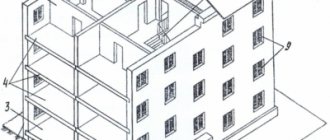What is it needed for?
A non-residential property management agreement is a written formal agreement concluded with the aim of regulating relations between the owner and the organization providing utility resources.
The owner has the right to create an offer (project), which specifies the terms of accrual and payment for his services. In turn, the resource supply company must approve or challenge any points and make its decision.
IMPORTANT ! In case of a negative response from the organization, the owner can accept the company’s terms or go to court to establish a fair solution.
Purpose of compilation
The interested party in the preparation of the draft agreement is the owner of the premises.
As of January 1, 2021, property located on the territory of an apartment building is recognized as not included in the common property, even if connected to communication networks (Government Decree No. 354).
The purpose of the agreement is to prevent controversial situations between the owner and the management company or homeowners association . Otherwise, the owner of the non-residential premises pays for all services on an equal basis with the home owners, participating in the maintenance and provision of common property.
All service points used by a citizen in non-residential premises must be indicated in this document and agreed upon with the management organization of the building.
Signs of publicity of an apartment management agreement
The first such feature is the fact that one of the parties to the agreement is the management company. And any management company is recognized as a person carrying out entrepreneurial or other profit-generating activities. The management agreement is concluded with a management company, which has been issued a license to carry out entrepreneurial activities for the management of apartment buildings (Part 1 of Article 162 of the Housing Code of the Russian Federation).
The second sign is the fulfillment by the management company of its obligations to perform work and provide services to the owners of premises in the apartment building for a certain monthly fee.
Well, the third sign recognizes the inadmissibility of the management company’s refusal to conclude an agreement or evasion of its conclusion in the presence of the opportunity to perform work and provide services. The obligation to conclude a management agreement for a management company is also enshrined in law in the event of its victory in an open competition, which is held by a local government body (parts 4 and 13 of article 161 of the Housing Code of the Russian Federation, part 8 of article 448 of the Civil Code of the Russian Federation).
But, of course, as in any business, there are also some nuances here. Firstly, the management agreement is concluded after a unanimous decision is made by the OSS. Thus, an individual owner does not have the right to single-handedly decide on the issue of concluding a management agreement with a management company .
Minutes of the general meeting of owners of an apartment building
267181
In addition, a management agreement can only be concluded with the owners of premises in an apartment building. A person who is not the owner cannot enter into a management agreement with the management company. Most importantly, the concluded management agreement is also valid for those persons who did not apply to the management company, did not enter into an agreement directly, did not take part in the OSS, voted against the election of this management company or did not sign the management agreement.
It is also important to consider that the price of work and services is the same for all owners of premises in an apartment building , except for beneficiaries. But this price cannot be the same for homeowners in different apartment buildings. That is, for owners of premises in one apartment building there will be one cost of work and services in the management agreement. Accordingly, for homeowners in another building, the contractual cost of work and services will be completely different.
Another important point that must be noted is the fact that the Housing Code of the Russian Federation does not establish the obligation of the management company to conclude a management agreement on the terms proposed to it by the owners of premises in an apartment building. On the contrary, when electing a management company to the OSS, homeowners must familiarize themselves with the version of the management agreement proposed by the management company and sign it or discuss making adjustments. You need to understand that when choosing a management company, the owners of premises in an apartment building simultaneously choose the terms of the management agreement proposed to it.
Features of agreements with the management company
According to Resolution No. 354, owners must choose one of the following organizations :
- With the MA, which sends information to the RSO (resource supply organization).
- Directly with RSO, coordinating the agreement with the MA.
In the first case, the owner sends the agreement to the RSO for review, and the latter, in turn, notifies the management company about the agreement. From the moment the agreement begins, the citizen becomes a client of the organization providing utility services. Other fees of the MA do not apply to him.
The second option is to coordinate the document with the MA. In this case, the management organization of the apartment building sends data to the RSO about the availability of non-residential premises in the property. Next, the MA notifies the owners of the obligation to conclude an agreement with the RSO.
What is a public contract
According to the law (Article 426 of the Civil Code of the Russian Federation), an agreement concluded by a person engaged in entrepreneurial or other profit-generating activities is considered public. A public contract establishes the obligations of a given person to perform work or provide services that an entrepreneur must carry out in relation to each client. In our case, the management company must perform work and provide services to homeowners under a management agreement for apartment buildings.
Basic terms of the MKD management agreement
324915
A person engaged in entrepreneurial or other profit-generating activities cannot give preference to certain persons when concluding a public contract. In other words, in a public contract, the cost of work and services should be the same for all owners of premises in an apartment building , except in cases where the law or other legal acts establish the provision of benefits to certain categories of citizens.
According to Article 421 of the Civil Code of the Russian Federation, citizens and legal entities are free to enter into an agreement. That is, no one can be forced to enter into an agreement, except in cases where the obligation to enter into contractual obligations is established by this Code, the law, or a voluntarily assumed obligation.
An entrepreneur does not have the right to refuse to conclude an agreement if he can perform work and provide services that are the subject of this document.
Service through HOA
The organization and provision of apartment buildings is often carried out by the HOA . To resolve all issues with this form of government, it is also necessary to agree on a specific management project.
Non-residential premises may contain significant communication structures, access to which is important for the entire house. The owner must agree with the HOA for permission to carry out maintenance on its territory.
According to the current amendments to Government Resolution No. 354, owners of non-residential premises are required to enter into contracts directly with the resource supplying organization .
ATTENTION! Otherwise, RSO distributes bills using a non-contractual method, which is much more expensive than after an agreement is concluded.
Non-residential premises in MKD
Since the new year, the nature of the relationship between the organization managing the house (management company, homeowners' association, housing or housing construction cooperative) and the owner of non-residential premises has changed.
Previously, such an owner had two options to receive housing and utility services: in the general manner through a management company, homeowners association, housing complex/housing cooperative or by agreement with a resource supply organization (RSO). Now the owner of the premises must enter into resource supply agreements under direct contracts with the RSO. The organization managing the apartment building acts as a third party in these relations. It no longer provides housing and communal services to premises that are non-residential. However, with all this, the MA has new responsibilities.
At the moment, the management organization, homeowners association, housing or housing construction cooperative must:
- notify the owner of non-residential premises of the need to enter into agreements with the resource supply organization and the regional MSW operator;
- receive a number of documents and mandatory information from the owner of the premises;
- information about the owners of non-residential premises in an apartment building.
Such changes are associated with the advent of the Russian Federation Regulation No. 1498 dated December 26, 2016 “On issues of providing utilities and maintaining common property in an apartment building.” This resolution included the above responsibilities in the so-called Rules No. 354 (Rules for the provision of utility services to owners and users of premises in apartment buildings and residential buildings, approved by Decree of the Government of Russia dated 05/06/11 No. 354).
This requirement does not apply to owners of parking spaces (car spaces) . The management organization, homeowners' association, housing or housing-construction cooperative interacts with these owners in exactly the same manner as with the owners of residential premises in an apartment building.
Question: who should commission and seal water, gas and electricity meters in non-residential premises?
After switching to a direct contract with RSO, work on commissioning individual metering devices must be carried out by the corresponding resource supply organization.
The supply of cold and hot water supply, thermal energy, electricity and gas to the non-residential premises of an apartment building, as well as water disposal (sewerage), must take place on the basis of direct agreements with the RSO. Such agreements are concluded in accordance with the current rules on water supply, sewerage, electricity supply, gas supply, heat supply (paragraph 3, paragraph 7 of Rules No. 354.
For example, the RF PP dated July 29, 2013 No. 643 approved a standard domestic hot water supply (hot water supply) contract. Clause 13 of this agreement provides for the obligation of the resource supplying organization to provide access to hot water meters (metering units). And clause 19 introduces the obligation to seal meters.
Agreement between the management organization and the owner of non-residential premises
What agreement is to be concluded between the management company and the owners of non-residential premises in the apartment building depends on the method of managing the house. If the management company manages the MKD, then the same rules apply; if it’s an HOA, a residential complex/housing cooperative, then others.
The management company manages the apartment building
The management company signs an apartment management agreement with each property owner. These conditions are approved by the OSSP (general meeting of premises owners) in the apartment building. In this case, the provisions of Part 1 of Article 162 of the Housing Code of the Russian Federation must be observed (equal conditions for all owners). There is no special agreement (form of contract) specifically for owners of non-residential premises in the law.
At the same time, the management agreement must contain provisions directly related to the owners of non-residential premises in the apartment building. There are two such special conditions:
- the owner’s obligation to enter into a written resource supply agreement with the RSO and an agreement for the provision of services for the management of MSW with the local regenerator;
- consequences of the event if the owner does not sign such agreements.
Such requirements are specified in paragraph 14, paragraph “p”, paragraph 31 and in paragraph 9, paragraph “k”, paragraph 148(22) of Rules No. 354. If your current apartment management agreement does not contain these provisions, you should definitely include them . This will free you from unnecessary disputes and misunderstandings with the owners.
Homeowners association, residential complex or housing cooperative manages apartment buildings
There can be two situations here, depending on whether the owner of the non-residential premises is a member of a housing association or not.
If the owner of a non-residential premises is not a member of a partnership or housing cooperative (housing-construction cooperative), then a contract (agreement) is concluded for the provision of services for R&D (maintenance and routine repairs of common property) (Part 6 of Article 155 of the Housing Code).
If the owner is a member of a housing association, then there is no need . Members of a homeowners' association, housing complex, housing cooperative are required to pay for the M&I of the industrial building in an apartment building in the manner established by the governing bodies of the homeowners' association, residential complex or housing cooperative (part 5 of article 155 of the Housing Code).
Notifying the owner of non-residential premises about the need to enter into agreements with RSO
Current legislation provides for the obligation to notify owners of non-residential premises in an apartment building about the need to switch to direct contracts. The notice period is not specified in the law, but it is best not to delay. The sooner non-residential premises in apartment buildings are notified, the less likely there are problems in the future.
The notification must contain three groups of information (paragraph 14 of subparagraph “p” of paragraph 31 and paragraph 9 of subparagraph “j” of paragraph 148(22) of Rules No. 354):
1. It is the responsibility of the owner of non-residential premises to enter into written agreements with the RSO and an agreement for the provision of services for handling MSW with the reoperator.
2. Consequences in case of non-conclusion of contracts. There will be consumption of commercial resources, but without a written contract. This means that the resource supplying organization will determine the volume of resource consumption in a calculated manner, which is provided for by current regulations. This method of calculating for resources is very unprofitable for owners of premises in apartment buildings. Non-contractual consumption of resources gives the resource supplying organization the right to stop supplying utility resources to a given non-residential premises, if such a technical possibility exists.
3. Link to pp. 6, 114 and 148(1) of Regulation No. 354 (rules on the obligation to conclude contracts and the consequences of their failure to comply).
It is recommended that the notice indicate the owner’s obligation to provide information and documents in accordance with the provisions of paragraph 18 of Regulation No. 354.
The notice must be delivered to the owners of non-residential premises simultaneously in two ways .
First notification method
In compliance with the norms specified in paragraph 4 of paragraph 6 and paragraph 5 of paragraph 148(1) of Rules No. 354, give a notice to each owner of non-residential premises in the house. Each copy must be signed by an authorized person (manager or representative by proxy) and sent by mail, delivered in person. The method of transmission of the notice must be recorded so that it is clearly established that the owner received such notice (for example, a receipt upon delivery).
Second notification method
Place a general notice for all owners of non-residential premises in apartment buildings on notice boards located:
- in all entrances of a residential building;
- in the premises of the management organization - in the place where the population is received.
This is provided for by the norms of paragraph 14 sub-clause. "p" clause 31 and paragraph 9 sub. “k” clause 148(22) of Rules No. 354.
Note! Failure to notify the owner of non-residential premises can lead to misunderstandings and disputes.
If the owner does not sign direct contracts with RSO, then resource specialists will determine the volume of commercial resources by calculation. This means that the property owner will pay more than expected. He can blame the management organization for such an overpayment and demand compensation for losses in the amount of the overpayment.
Judicial practice has not yet been formed, so it is difficult to say what the court will decide in such a situation. The very fact of the dispute already has a negative consequence.
Question: does the tenant have the right to independently enter into direct contracts with RSO?
No, he does not have such a right. The responsibility lies only with the owners of non-residential premises (paragraph 3 of paragraph 6 of Rules No. 354).
Question: does the owner of non-residential premises need to renew agreements with RSO that were previously concluded?
No, it is not necessary if they do not contradict current legislation. These agreements were concluded by real estate owners in accordance with the rules of civil law in force at that time. Only they were concluded as a right, and not an obligation, for these owners of non-residential premises.
What documents and information do you need to obtain from the owner of non-residential premises?
The owner of the property is obliged to transfer documents and information to the management company (HOA, residential complex, housing cooperative). They are necessary for the management organization to manage apartment buildings, these are: copies of resource supply agreements with RSO. The MA has the right to demand a copy of the agreement with the RSO from the moment of conclusion (clause 18 of Rules No. 354). But in fact, the moment of conclusion of the MA may not be known. Therefore, it is necessary to send a request to the owner of non-residential premises in the apartment building with the wording: “Based on clause 18 of Rules No. 354, we ask you to provide us with copies of all your contracts with resource supply organizations. If you have not yet concluded direct agreements, please provide copies of them within 3 (three) days from the date of signing.”
In addition, non-residential premises in apartment buildings must provide the management with the following information:
- Volumes of utility resources consumed during the billing period under resource supply contracts. Property owners are required to provide this data in the same manner and within the same time frames as ordinary owners of premises (clause 18 of Regulation No. 354).
- Volumes of MSW management services provided during the billing period under an agreement with the regional MSW operator. The owner of non-residential premises is obliged to provide this information within three working days from the date of receipt of the request from the MA (paragraph 4 of paragraph 148(1) of Regulation No. 354).
Question: what to do if non-residential premises in an apartment building do not transmit data on the volume of consumed utility resources to the management company, homeowners' association, residential complex, housing cooperative
A written request for information can be sent not only to the owner, but also to the relevant resource supply organization (subparagraph “e(1)” of paragraph 18 of Regulation No. 124). RSO must take into account separately the volume of supply of communal resources to owners of residential and non-residential premises in apartment buildings.
Transfer of information about the owners of non-residential premises to the RNO and the regional MSW operator
There is one more responsibility of the management organization. She is obliged to transfer information about the owners of non-residential premises to the RSO and to the registrar for the management of solid waste (paragraph 4, paragraph 6 and paragraph 5, paragraph 148(1) of Rules No. 354).
To fulfill this obligation, the notice must indicate the following:
- address of the house where non-residential premises are located in the apartment building;
- list of non-residential premises;
- Full name or name of the organization owning non-residential premises.
Additionally, you can specify: telephone numbers of the property owner. This will help resolve unforeseen issues that may arise for the RSO and the regional MSW operator.
Send the message in any convenient way that records receipt of the correspondence.
Non-residential premises in MKD
3.3 (65.71%) 14 vote[s]
Structure
The document consists of several parts:
- General provisions, which indicate the main concepts included in the agreement.
- Subject of the agreement: characteristics of the parties and the resources provided.
- Duties of the parties.
- Rights.
- Calculation of prices for utility services.
- Cost and payment procedure.
- Responsibility of the management authority (HOA, RSO) and the owner.
- Validity period of the document.
- The procedure for termination and resolution of disputes.
- Additional terms and conditions.
- Additions.
- Addresses and signatures of the parties.
- An application that indicates tariffs and prices for public services.
- Signatures of the parties to the agreement.
The document is completed in writing, in two copies , one of which remains with the owner, and the other is sent to the management organization of the apartment building.
What items are required to be filled out?
The draft agreement is drawn up in writing according to the established template in two copies.
The registration procedure is as follows:
- At the very beginning of the document the following is indicated in words:
- Full name of the owner;
- postal address of non-residential premises.
- In paragraph 2 “Subject of the agreement” the total area (in sq.m.) is indicated.
- The sixth paragraph establishes the approximate amount of the owner’s monthly payments under the contract (the amount is indicated by a numeral name, not a number, for example: four hundred and thirty rubles).
- In the eighth, the start date and end date of the contract are written down (in numbers).
- Clause 12 indicates the legal addresses of the participants and their signatures.
- The application indicates a complete list of services provided, the approximate amount of resources used, the tariff and the estimated price.
- Signatures of the parties at the end of the agreement are required. Otherwise, this document is not valid.
REFERENCE. The contract form, which specifies the rights and obligations, responsibilities, subject matter, terms of the agreement and termination, can be obtained from a law firm, where a specialist will provide additional advice on each issue.
Terms of termination
The agreement for the management of non-residential property is terminated:
- by agreement of both parties;
- unilaterally.
The owner has the right to change the organization providing utility services once a year, notifying about his decision one month before termination.
Changes to the contract may lead to litigation and unilateral termination of the contract.
The new rules for concluding an agreement between the owner of non-residential premises and the management organization make it possible to resolve resource supply issues without conflicts and litigation.





